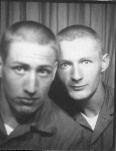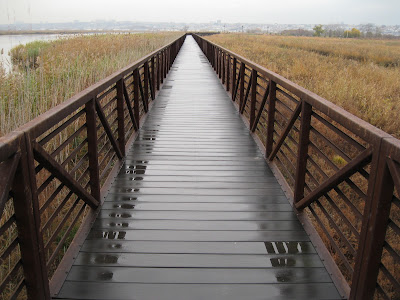Chapter 4: Flight to the crossroads
I stared at his suspicious eyes in the rearview mirror
knowing he would remember me later, hard eyes of a man who had been wrung
through the late-night ringer of violent Paterson Street, no doubt robbed a few
times, maybe stabbed or shot, eyes aware of trouble when they saw it, and they
seemed to see trouble in me.
His gray brows rose over the black rims of his eyeglasses
like question marks as he wondered what an underdressed young man like me was
doing up this early, guessing perhaps from the cut of my hair that I was in the
military or fresh out of it.
That might have been the selling point that made him accept
me as his fair. Had I looked the way I had looked before the Army, he might
have passed me by, his blue-collar background hating hippies as much as much my
uncles did.
He steered the cab straight down Main Avenue, headed in the
direction of Passaic, over more of my old stomping ground, under the parkway
overpass, passed the massive old silk factory on the left, and Christopher
Columbus Junior High (where Dave and I had briefly gone together) on the right,
its huge columns like something out of a Greek tragedy – dawn casting enough
light over it for me to see the building’s reflection in the small pond I used
to ice skate on when very small -- the huge
oak on the overlooking hill marking the place I came to each 4th of July to
watch the fireworks over the nearby football stadium.
This only made me think of Sue Brett, the girl who lived
next door to me, and on whom Dave and I both had a crush, long gone as with her
family to some town in central or south Jersey, part of the scattered seed of
the old neighborhood none of us would see again.
The driver broke the silence.
“So, what’s up with you?” he asked.
“I don’t understand,” I said, hating the intrusion.
“Are you coming from a party or what?”
Again, I saw his eyes in the mirror, his gaze studying me
intently rather than the road. He had a stiff red neck which I caught a glimpse
of as his head so he could look more directly at me.
“I’m on my way to meet a friend,” I said – which wasn’t
exactly a lie since I intended to seek out Louise. She just happened to be in
Colorado, then added a deceptive twist to my tale, “We’re supposed to go away
tomorrow – well, today now. We’re taking an early train to Boston.”
I deliberately picked a direction opposite the one I
intended to take. If questioned, he would remember it, and this might buy me
time until someone decided I hadn’t gone that way at all.
My hands shook. I glanced away from him and back out into
the lessening dark of the street, wondering if the driver had bought my
bullshit or did, he perceive my deception and intended to flag down a cop car
the minute we got closer to the Police Station near Clifton Avenue and Main.
I saw him nod.
“I went to Boston once,” he said. “I didn’t like it much.”
The people he met in pubs were fine, he claimed, but he
hated the college kids and their professors, self-righteous blowhards who
insisted on lecturing him even during a casual conversation.
The driver sounded a lot like my uncle Harold, who had
joined the John Birch Society because of “the communists” infiltrating America.
He wasn’t wrong. Hank had dragged me to enough places in the
East and West Village for me to have encountered similar people. There were
even bars on Christopher Street where student Marxists hung out and plotted the
overthrow of capitalism. It was like a religion I felt no compulsion to join.
Even Abbie Hoffman, who Hank had introduced me to several times seemed to have
drunk that Kool Aid, an uncomfortable mix of well-meaning delusion and lust for
power. But Abbie never lectured me the way the Marxists did, which is probably
why I liked him.
The driver apparently assumed I was sympathetic to his cause
because of my military haircut and felt comfortable confiding in me. But
because he was so much like Harold, I felt uncomfortable. He only reminded me
of what I had done and the soon-to-rise Harold back at the house about to
discover my crime.
“We’re going to Boston to see my father,” I said, building
my lie on a partial truth since my father and his family had originally come
from East Boston – though I had no clue as to where he was now. He fled when I
was only months old so I suspected I might never see him. But it sounded like a
good lie. “We’re going to stay there until after Thanksgiving.”
The driver nodded, by which time we had driven through Clifton
and had reached the ramp onto Route 3 (which my family still called S-3), the
sweet smell of Hoffman LaRoche filling the air, perfume released to cover the
raunchy scent of the strange chemical brews they concocted there – the whole
landscape along that side of the highway lit up like some science fiction
scene. Darker and on the other side of the highway, the Union Camp Nevins
facility stood, a few internal lights testifying to some activity, reminding me
of where I was going and who I was going to see since I had met Louise there before
I joined the Army and before she fled west. For some reason, the cab slowed allowing
me to study the scene better, the vast and mostly empty parking lot, the long
road behind it Louise and I used to climb going to the bus stop after our
shifts had ended.
The vague idea that life might have turned out differently
had I chosen to keep the job. Maybe would have stayed around, too, making my
theft and subsequent flight unnecessary.
The cab sped up again. The scene vanished into the dark
behind us. The disguised smell of chemicals faded, too, with only the stale
smell of the driver’s cigar filling the air in the cab. Ahead of us, the distant
New York skyline glowed with its array of lights, nearly as much science
fiction as the chemical plant, Avalon in the mists, framed by the growing glow
of dawn behind it.
I shivered, clutched my stomach, feeling the slowly growing
nag of hunger – and concern.
I did not believe for one moment I would be safe there, knew
that I would have to continue my flight because my uncles – with or without the
help of the cab company – would assume my flight would take me there, assuming
I would seek protection from Hank who lived there, and perhaps another time,
they would have been right. But I knew I could not afford to linger in the bus
terminal long because it was the crossroads my uncles knew I would have to cross.




Comments
Post a Comment